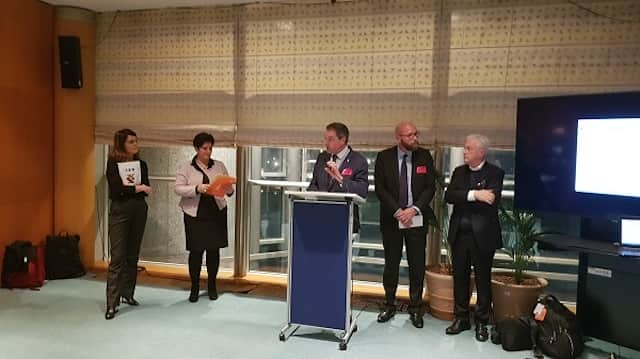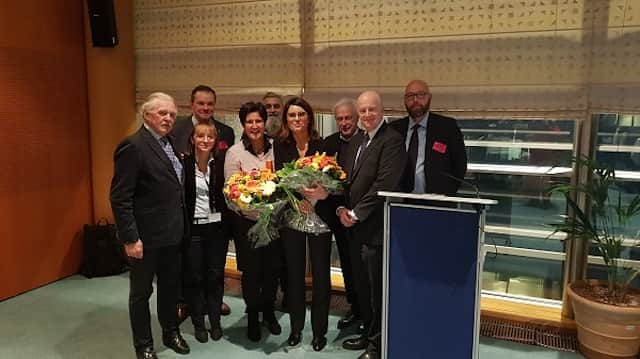
The European Confederation of Woodworking Industries (CEI-Bois), the European Organisation of the Sawmill Industry (EOS) and the European Panel Federation (EPF), organised the 8th edition of theClub du Bois, under the chairwomanship of MEP Mrs Maria Noichl, on 8 January 2020, at the Brussels premises of the European Parliament.
The event gathered an important number of MEPs, industrialists and experts from the wood manufacturing and forest-based family, offering them the opportunity to learn about the priorities of the European Woodworking Industries for the term 2019-2024. The evening was opened by a welcoming speech from MEP Mrs Maria Noichl and followed by three presentations from EPF Chairman, Dr Paolo Fantoni, EOS Chairman, Mr Sampsa Auvinen and by CEI-Bois Board of Directors Member, Mr Keith Fryer.
The Woodworking Industry lies at the heart of the circular bioeconomy providing a sustainable and carbon neutral product to be used in the construction sector and as everyday material. By using wood, legally harvested from sustainably managed forests, Europe can achieve several of the objectives presented in the recently adopted ̈The European Green Deal ̈ and become the world’s first climate neutral continent by 2050.
Dr Paolo Fantoni highlighted the role that wood-based panels can play in the ̈renovation wave ̈, reminding of their sustainability, resource efficiency and natural carbon storage properties. Panels are a model example of the Circular Economy thanks to the industry’s innovative approach of turning one industry’s waste into another sector’s product, with 40% of typical particleboard today coming from recovered (recycled) waste wood. EPF is excited to work with universities and the EU institutions to ensure that future generations are trained and skilled in working with wood. Given their proprieties and characteristics, wood-based panels are model examples of both the Circular Economy and the Green Deal. ̈Panels can break the old model of economic progress or environmental protection. Instead we can offer new industrial growth with environmental (and climate) benefits̈ commented Dr Fantoni.
Mr Sampsa Auvinen described the raw material supply question as the most important issue affecting the development of the primary mechanical wood industry. Securing raw material supply at affordable prices and in a predictable way is a key factor to maintain competitiveness of the European sawmill industry. Mr Auvinen called for an EU resource management system aiming to establish a harmonised knowledge-based information on European forests resources, material flows and stock. The system should also take into consideration frequency of natural disturbances and the impact on wood supply. Mr Auvinen recalled the central role of the European sawmill industry in the forest industry: making up two thirds of the forest owners’ incomes, the sawmill industry plays a key role in motivating forest owners to sustainably manage their forests and supply wood raw material to the forest industry. ̈A healthy sawmill industry is thus vital for the forest industry and the forest-based industries alike ̈ he added.
Mr Keith Fryer presented the European Woodworking Industries’ manifesto for the EU term 2019-2024, which illustrates how the European Woodworking Industry can help the EU to reach its key goals, such as the reduction of GHG emissions in line with the Paris Agreement and the deployment of an EU circular Bioeconomy, while ensuring jobs creation and employment stability. The manifesto focuses on 6 priorities – Wood Availability and Sustainability, Circular Bioeconomy, Competitiveness of Wood in Construction, Free but Fair Trade, Research & Innovation and Industrial Relations & Social Affairs – and gives an overview of the potential and needs of the sector. ̈The European Woodworking sector sits at the heart of the European circular Bioeconomy and is a key driver for jobs and growtḧ Mr Fryer concluded.
The European Woodworking Industry can successfully achieve socially fair economic growth while reducing pollution and harm to the environment. This is why the European policies, such as the forthcoming Industrial Strategy and new Circular Economy Action Plan, to name a few, should explore the full potential of one of the most climate positive European manufacturing sectors.
The meeting ended with a Q&A session and the formal handover of the Club du Bois Chairwomanship from MEP Mrs Maria Noichl to MEP Mrs Simona Bonafè.
